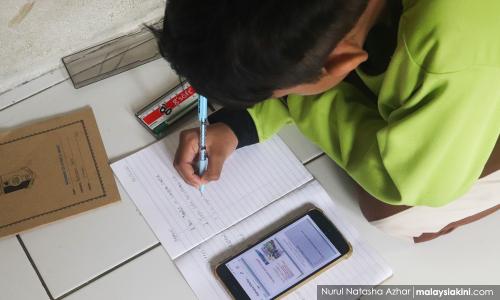LETTER | Decentralising education - a better approach for students
LETTER | As online classes continue, more students are being left behind. Pre-Covid-19 pandemic, we have seen that Malaysia’s Programme for International Student Assessment (Pisa) score in 2018 was below average amongst OECD countries.
In reading, we had a mean score of 415 points while in mathematics and science, it was 440 points and 420 points respectively. Malaysia can expect the score to fall short in the next assessment in comparison with before because of disruption in the online learning process.
This is due to problems that are faced by students such as unstable Internet, learning equipment constraints and inability to follow the current syllabus. Despite that, at the end of every year, teachers are still expected to fulfil the teaching plan as listed out by the Ministry of Education.
To be clear, Malaysia has a centralised approach to education. This entails that a central body has the authority and decision-making power instead of the school and community in general. It’s more commonly known as the top-down approach, and in Malaysia, the central body will construct the curriculum, employment of teachers and allocation of resources and budget.
All the crucial decisions and changes are to be set only by the Education Ministry and later passed down to the school through the local district authority. Thus, we can see that the policy is general and all-rounded to suit the needs of Malaysia in general instead of catering to the needs of the local communities.
Is this really effective in helping students to regain their time that has been lost in education?
Based on Unesco’s International Institute for Educational Planning, the decentralisation of education could help the learning process of students. It can be said that by decentralising education, the decision-making responsibility is transferred to the school.
The first benefit is that schools will be given the autonomy to decide the curriculum of their own school. They will have the power to rearrange the syllabus based on priority to ensure no student will be left behind and the learning objective could still be fulfilled.
This is more crucial in remote areas as it is hard for students to attend online classes. Their short attention span should be taken advantage of by teaching them significant topics rather than focusing on finishing every topic.
Secondly, the community and local stakeholders will have a say in improving the learning outcomes and quality of teaching. Not to forget, when these key players feel their suggestion and idea is implemented, it could give them a sense of ownership for an overall vision.
Parents play a big role to check and balance in these situations. They need to give attention to the problems that their children are experiencing during the learning process and give feedback to the school.
By collecting these concerns and suggestions from the community, schools can have a better understanding of the conditions of the students. As a result, teachers can personalise the method of teaching and the learning material based on it. Thus, the cybergogy experience could be comprehensively improved.
Another benefit of decentralisation is that it could give schools faster response times based on local situations. Reflecting on our current situation, there are areas that have thousands of Covid-19 cases and through this initiative, schools can decide on the implementation of online learning for a few more months without waiting for a decision by the ministry.
This is important as previously we could observe the implication of the ministry's late responses towards issues when many problems had occurred such as virus outbreak at schools which result in unpreparedness of teachers and students to do online learning
If teachers were given the opportunity to plan, it would be more beneficial as they could prepare in advance the activities to do in class with the designated amount of time. This is far more effective than having to plan for only a two-week duration then continue to wait for a notice from the Education Ministry and repeat this cycle.
Although this initiative will give more autonomy to the schools, I still believe that the school’s plan should always be in line with National Education Philosophy. This is important to develop individuals that are holistic and balanced.
Are there any other countries that have implemented such a drastic change during this Covid-19 period?
Surprisingly, other countries have made changes to their curriculum to suit the current changes in education and the closest example that we can see is Indonesia. They have reduced their curriculum and selected only the important ones to focus on. This is to lessen the burden of teachers and students during teaching and learning sessions.
It is also worth noting that Indonesia's “Merdeka Belajar” initiative that was introduced earlier this year has given teachers more freedom in conducting classes based on their curriculum.
The views expressed here are those of the author/contributor and do not necessarily represent the views of Malaysiakini.
RM12.50 / month
- Unlimited access to award-winning journalism
- Comment and share your opinions on all our articles
- Gift interesting stories to your friends
- Tax deductable
